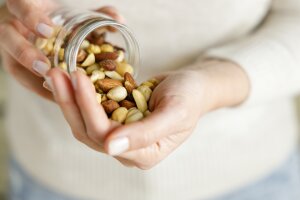Nuts, known for their remarkable health benefits, have been a subject of numerous research studies over the years. These small but nutrient-dense foods are packed with plant-based protein, unsaturated fats, essential vitamins and minerals, fiber, antioxidants, and other bioactive compounds. A staple in the Mediterranean diet, nuts are linked to a reduced risk of obesity, Type 2 diabetes, heart disease, certain cancers, and other conditions associated with systemic inflammation.
This article highlights five of the healthiest tree nuts, their nutritional benefits, and suggests ways to include them in your diet.
Macadamia Nuts Each 1-ounce serving of macadamia nuts (about 10 to 12 nuts) contains 200 calories, 22 grams of fat, and 2 grams each of carbohydrate, fiber, and protein. These nuts are rich in monounsaturated fats and phytonutrients beneficial for heart health and inflammation reduction. They are also an excellent source of iron, niacin, magnesium, manganese, selenium, and potassium. A study in the Journal of Nutrition found that consuming 1.5 ounces of macadamia nuts daily can lower total and harmful LDL-cholesterol levels.
Ways to Enjoy: Macadamia nuts can be enjoyed as butter, a crunchy topping for fish and poultry, or in baked goods. They are also popular in paleo and low-carb recipes.
Pistachios A serving of pistachios (1 ounce or about 49 nuts) provides 160 calories, 13 grams of fat, 8 grams of carbohydrates, 3 grams of fiber, and 6 grams of protein. They are a source of protein, fiber, healthy fats, antioxidants, and several essential nutrients including copper, thiamin, vitamin B6, and phosphorus.
Ways to Enjoy: Enjoy pistachios as a snack, in salads, with cooked vegetables, desserts, pasta, or as a crust for fish and poultry. Pistachio pesto is also a versatile condiment for a variety of dishes.
Walnuts A 1-ounce serving of walnuts (about 14 halves) contains 190 calories, 18 grams of fat, 4 grams of carbohydrates, 2 grams of fiber, and 4 grams of protein. Walnuts are unique in providing an excellent source of omega-3 fatty acids, with 2.5 grams per serving. Studies have shown that walnuts can help protect against various health conditions and improve diet quality by increasing intake of omega-3 ALA, fiber, magnesium, and copper.
Ways to Enjoy: Walnuts can be used in meatballs, meatloaf, tacos, salads, pasta, and oatmeal. They also pair well with savory seasonings for enhanced flavor.
Almonds Each 1-ounce serving of almonds (about 23 nuts) offers 160 calories, 14 grams of fat, 6 grams of carbohydrates, 4 grams of fiber, and 6 grams of protein. Almonds are known for their high protein and fiber content and provide essential nutrients like magnesium, manganese, riboflavin, phosphorus, and copper. Research indicates almonds can aid in exercise recovery and skin health.
Ways to Enjoy: Almonds are great for snacking, making energy bars and balls, pesto, and pie crusts. They also add a nice crunch to salads and cooked vegetables.
Cashews In a 1-ounce serving of cashews (about 18 nuts), there are 160 calories, 19 grams of fat, 6 grams of carbohydrates, 4 grams of fiber, and 4 grams of protein. Cashews are notable for their iron, phosphorus, copper, manganese, and zinc content. Studies suggest that cashews can help in reducing cholesterol levels, body fat, and improving blood vessel function.
Ways to Enjoy: Cashews enhance the flavor of Asian-inspired dishes, protein balls, salad dressings, and soups.










